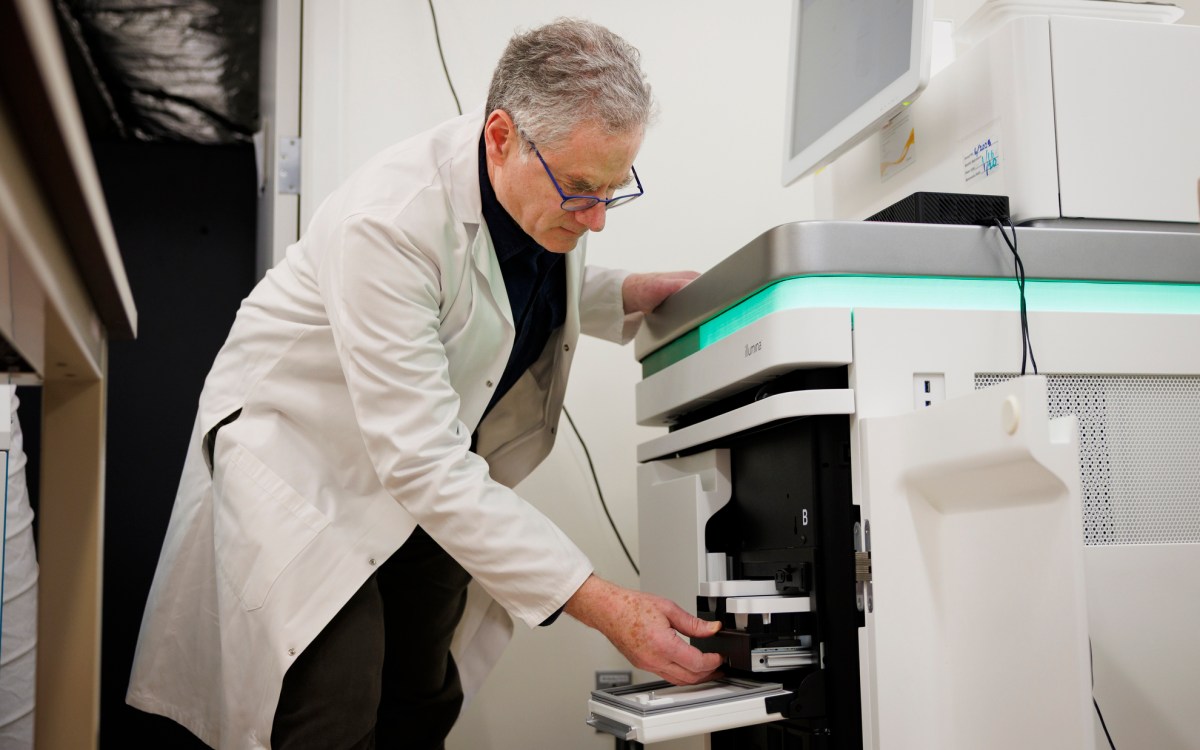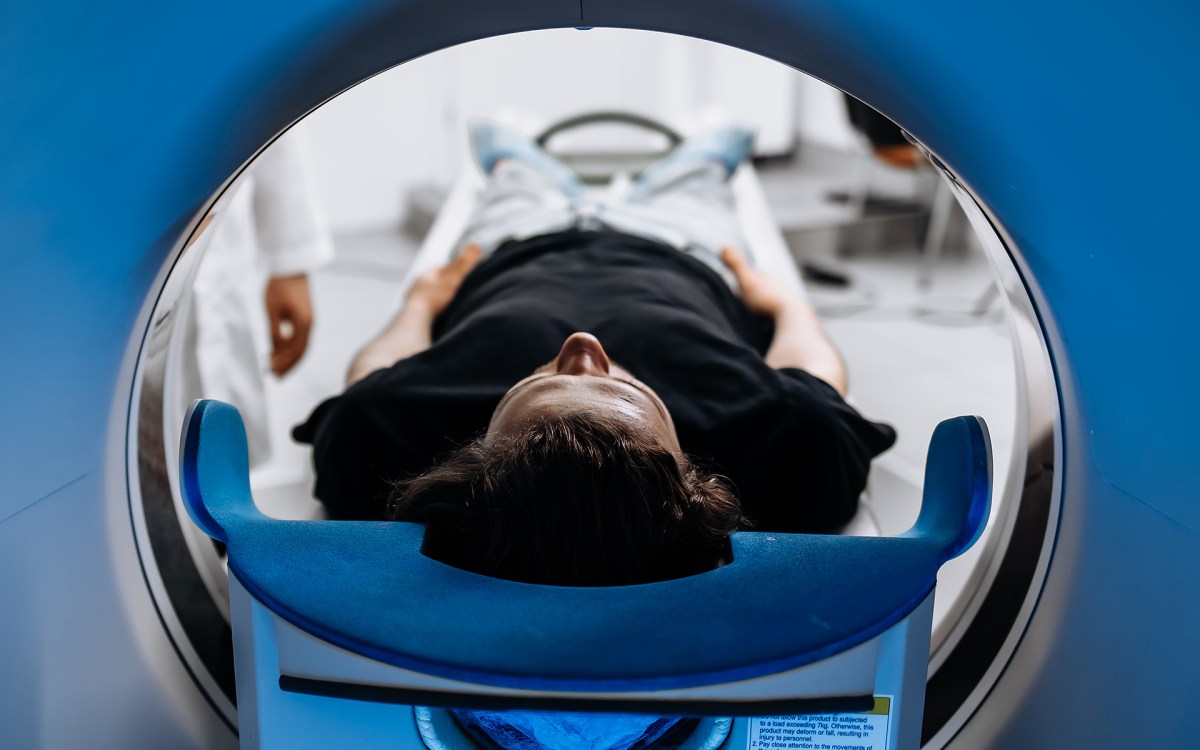Health
-

New AI tool predicts brain age, dementia risk, cancer survival
Unlike other AI models, BrainIAC needs limited data to ID key neurological health indicators

-

It’s time to get more comfortable with talking about dying
Palliative care physicians offer advice for end-of-life conversations between patients, loved ones
-

Turns out inherited eye diseases aren’t a sure thing
Study finds only fraction of those with mutated gene develop malady — a finding that could lead to better treatments (and could apply to other such illnesses)
-

How smoking divides America
Mapping the midlife effects of a lethal habit
-

Americans living longer after cancer diagnosis
Oncologist explains why rising survival rates only tell part of the story
-

Parental firearm injury linked to surge in children’s psychiatric diagnoses
Trauma/post-traumatic stress disorder accounts for most of the increase, according to study

-
Protein in urine may warn of preeclampsia risk in pregnant women
Preeclampsia, or toxemia, develops during pregnancy. In severe cases, it can rapidly escalate to eclampsia, a condition in which the mother suffers a series of potentially fatal complications. Ananth Karumanchi,…
-
Researchers discover why we go gray
People turn gray, Harvard scientists found, when certain adult stem cells gradually die off. The stem cells provide a continuous supply of other, pigment-producing cells that give your hair its…
-
Anti-psychotic drugs may be associated with increased risk of diabetes in schizophrenia patients
According to the article’s background information, “Recently, the newer ‘atypical’ antipsychotic agents have been linked to several forms of morbidity, including obesity; hyperlipidemia; type 2 diabetes mellitus; and diabetic ketoacidosis…
-
Study finds heavy drinking linked to higher stroke risk
A study found that while light and moderate drinkers appear to be at neither greater risk nor greater advantage than abstainers when it comes to ischemic stroke, the frequency of…
-
Researchers identify gene’s role in suppressing longevity
SIRT1 is involved in cellular senescence, or limitation of cells’ reproductive lifespan, a process thought to ensure that aging cells don’t pass on harmful mutations. Frederick W. Alt, a Howard…
-
Extended release stimulant effective for long-term ADHD treatment
In the October 2005 issue of the Journal of the American Association of Child and Adolescent Psychiatry, a multi- institutional research team reported finding that treatment with Concerta, a once-daily…
-
Researchers find a gene for fear
A team of researchers from Harvard, Columbia, and Rutgers universities has found the seat of fear. It’s located in a pea-sized area deep in the brain of all mammals, from…
-
Study casts doubt on claims that the medical malpractice system is plagued by frivolous lawsuits
The debate over medical malpractice litigation, which raged during the last presidential campaign, continues as a hot-button political and health care issue in the U.S. The Senate is expected to…
-
Study suggests obesity has lesser financial impact on African-Americans
The study published in the January 2005 issue of the American Journal of Public Health is among the first to examine how patient demographic factors affect the relationship between body…
-
Faulty gene signaling could lead to development of Crohn’s disease
According to the study’s lead author, Brigham Women’s Hospital’s Derek W. Abbott, “The discovery of this faulty signaling process is a first step in helping us understand and ultimately address the underlying mechanism that causes Crohn’s disease to develop.
-
Study finds that both weight and exercise are key to longevity
Over 115,000 participants who were free of cardiovascular disease or cancer, who were between the ages of 30 and 55 and had filled out biennial health and lifestyle questionnaires between…
-
Molecule implicated in transcription termination
When a protein is made its DNA code must first be rewritten as messenger RNA (mRNA). This process of transcription requires a large enzyme complex, RNA polymerase, to begin at…
-
DNA splicing enzyme observed in action
Researchers in the lab of Tom Ellenberger, the Hsien Wu and Daisy Yen Wu professor of biological chemistry and molecular pharmacology at Harvard Medical School, reported the doughnut shape of…
-
Protein reverses engineering of chromosome structure
An enzyme, a histone demethylase, removes methyl groups appended to histones, nuclear proteins that organize DNA and regulate gene activity. Methyl groups and other chemical tags on histones regulate how…
-
Researchers find high levels of potentially toxic heavy metals in herbal medicine products
“This study, yet again, highlights the need for Congress to revisit the way dietary supplements are regulated in the U.S.,” said co- author David Eisenberg, MD, the Bernard Osher Associate…
-
Study finds women hesitant to take tamoxifen as preventive measure
“Our study underscores the need [for medical professionals] to address psychological factors that may influence decision- making, in order to help women feel confident and satisfied with their treatment choice,”…
-
Accumulated low-level lead exposure can lead to cataract development in men
According to lead author Debra A. Schaumberg, Sc.D., O.D., M.P.H. of BWH, “This research suggests that reduction of lead exposure throughout a man’s lifetime should help reduce his chances of…
-
Sudden death among military personnel often caused by exercise and an identifiable cardiac abnormality
According to the study’s lead author BWH’s Robert E. Eckart, D.O., they had expected that most of the sudden deaths would stem from structural heart abnormalities, but that in actuality,…
-
Grandkids can make you sick
A study by researchers from the Harvard School of Public Health and Harvard Medical School shows that women who care for grandchildren more than nine hours a week have a…
-
Elevated BMI may not increase risk of death among men with heart attack or stroke
“This study does not eliminate a small amount of risk for being overweight or obese,” said author Howard D. Sesso, Sc.D., M.P.H., of BWH. “However, it does tell physicians that…
-
Drugs are effective against eye disease
Results of two large international clinical trials have shown positive results using Macugen, an experimental treatment that targets the abnormal blood vessels found in the “wet” form of macular degeneration.…
-
Gene expression profiling helps in ovarian cancer prognosis
Steven A. Cannistra, M.D., director of Gynecologic Medical Oncology at BIDMC and associate professor of medicine at Harvard Medical School, says ovarian cancer is often not detectable until its later…
-
Studies demonstrate positive data in treatment of hepatitis C
Presented by Nezam Afdhal, M.D., chief of Hepatology at Beth Israel Deaconess Medical Center (BIDMC) and associate professor of medicine at Harvard Medical School, the new findings demonstrate promising results…
-
Risk of becoming resistant to antibiotics may be lower than expected for chronic sinus infection sufferers
“This study was designed to help determine how great a risk antibiotic resistance was among chronic sinus patients to determine if there is a need to re-evaluate how we diagnose…
-
Study finds that blacks are significantly less likely to undergo prostate cancer screening
In a study involving more than 67,000 men age 65 years and older, the researchers found that blacks were 35 percent less likely than whites to undergo prostate-specific antigen (PSA)…
-
Study says therapy better than pills in treating sleep-onset insomnia
The findings show non-drug techniques yield better short- and long-term results than the most widely prescribed sleeping pill, zolpidem, commonly known as Ambien. “Sleeping pills are the most frequent treatment…
-
Walking improves cognitive functions in older women
In a study, elderly women who engaged in the most activity — for example, walking at least 6 hours per week — had a 20 percent decrease in risk of…
-
Mechanism helps describe how airways respond to constriction
In asthma, substances such as allergens irritate the airways and cause the smooth muscle cells around them to contract. With repeated attacks, lung tissues become damaged from cycles of inflammation…
-
The tale of the tail
Sharks’ tails have always mystified biologists. Their relatives, hundreds of different species of fish, happily push themselves through the water with symmetrical tails that move from side to side. But…
-
Study finds leptin plays a key role in women’s health
Senior author Christos Mantzoros, M.D., director of the Human Nutrition Research Unit and clinical research overseer of the Department of Endocrinology at BIDMC and associate professor of medicine at Harvard…

